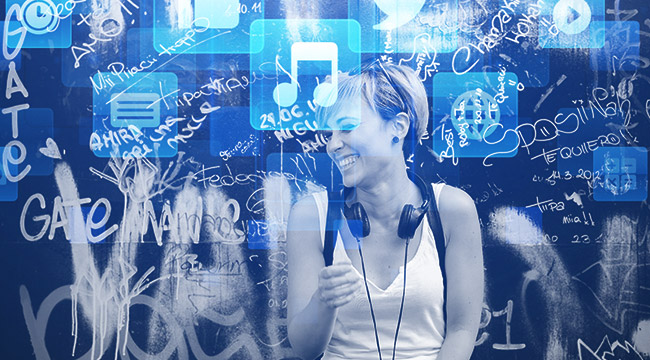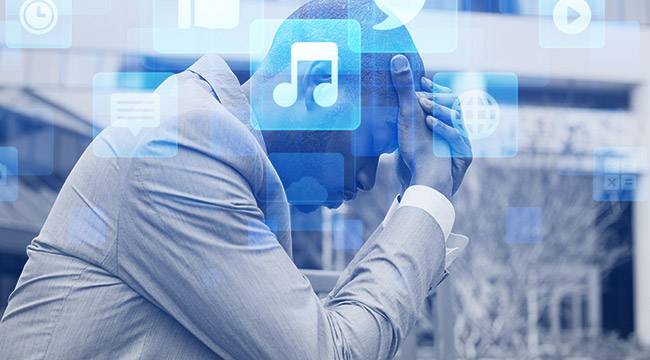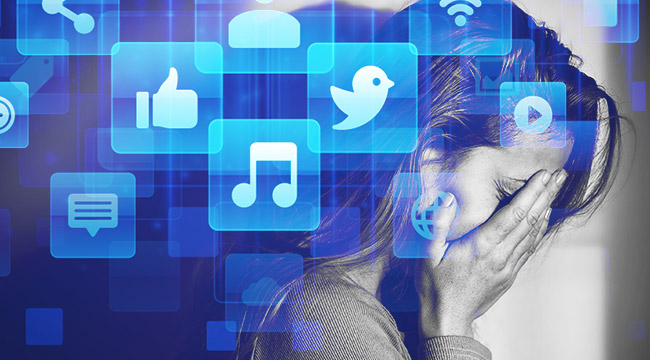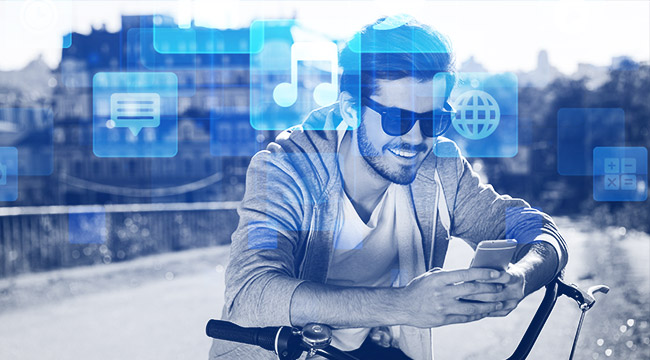
Ask anyone what you should do when you’re feeling lonely, anxious, and depressed and they’ll probably tell you the same thing: Get off social media immediately! Why? Because as we all know, seeing the Insta-stories from a party you weren’t invited to is only going to make you feel worse. And even when you know what you’re being shown is a highly curated selection of words and images, you can’t help but feel dejected.
So what do you do? You swear off Snapchat and Instagram. You deactivate your Facebook account. You delete your Twitter and you magically feel better. That feeling lasts for a few hours, maybe a few days, but then you start running into problems. Social media is the only way you and your friends communicate and you’re suddenly struck by the panicky feeling that you’ll never speak to any human ever again. So you come crawling on back, enveloping yourself in the scratchy security blanket that social media provides, and promising that this time things will be different.
If this sounds like you, don’t feel too bad. According to recent data, many of us spend at least 50 minutes a day on Facebook and its subsidiaries (not to mention other platforms) without even noticing. Social media has embedded itself so seamlessly into our modern lives that going without is almost impossible. Even if it weren’t for your friends and relatives demanding to know why you’ve deleted your account and dropped from their friends list, there’s the issue of signing up for things via Facebook and Twitter. It’s become so easy to link everything that even typing our names and email addresses seems like a Herculean feat by comparison.
Is there any real solution? Aaron Harvey, the founder of Intrusive Thoughts, a resource network for people struggling with Obsessive Compulsive Disorder (OCD), has been puzzling over that question for a long time. Diagnosed with OCD, Harvey — who started his organization to help explain and normalize the anxiety so many people feel — wants to lessen the stigma that those living with mental illness face. And though he knows that there are reports on top of reports that suggest that social media is a major component when it comes to increasing the severity of anxiety and depression, he also believes that it’s one of the best ways we can utilize the internet to help ourselves.
“I travel a lot for work,” Harvey says. “I can be alone and feeling nothing but self-loathing, but if I’m able to go on Facebook, or Instagram, or text message, or threads, or messenger, or whatever it is, I can actually realize that I have all these people in my life that maybe aren’t wherever I am, but that I can reconnect with quickly. The idea is connection and community and if that’s what you’re using social media for then the benefits outweigh the costs.”
Harvey’s not alone in this belief. He’s working with several psychologists and others in the mental health profession to find ways in which people can support each other, while still using social media in a healthy way. So how do you reset your mind and your expectations to make social media a net positive in your life rather than a wall of anxiety and resentment? It starts with notifications.
NOTIFICATION JUNKIES

You know when you took that psychology class freshman year and your professor described how lab rats would push on a lever to get a treat and then do it over and over again to explain behaviorism? That’s the same way that notifications work. Think about it: Are you one of those people who wakes up every morning and immediately checks whether someone’s liked your pictures or status updates while you were sleeping? You’re not alone. If social media wasn’t designed to get you to focus on these things, why would there be likes and comments in the first place? And why would we put such an immense societal weight on the validation that comes with “followers”?
“Alerts and notifications can increase anxiety,” Harvey says, “and that obviously makes it harder for someone who’s already anxious and depressed.”
How many times have you posted something and then either immediately gotten anxious about whether you’d get likes? That doesn’t make you crazy. In fact, using social media as a motor for validation is connected to dopamine — that’s the neurotransmitter that’s all about reward and often discussed when we talk about addiction. And the more you activate the dopamine system, the more it wants to be activated. Get five notifications from a first-time post and you suddenly feel amazing (if only for a short time). But as you continue being involved in social media, your brain demands more. After a while, five likes may not be enough; 10 may not be either. And if you suddenly stop getting notifications… what then?
So how do you break the cycle of feeling anxious and depressed when you use social media? First, consider what you’re really after when you’re posting on social media. Second, think about why those notifications are important to you and why you want or need them. And then think about whether, in the grand scheme of things, it really matters. After all, if it’s causing you anxiety, is it really worth it?
It’s also important to start thinking about your social media in a more mindful way. Sure, it sounds strange to be told that your Facebook use should be more strategic, especially if you’re not a marketer, but your Instagram feed and Twitter timeline need to configured to make sure that you’re not constantly being overwhelmed with information.
In order to declutter your mind, Harvey says you need to start thinking about how to streamline your feeds and to actually focus on who and what you follow on different social media channels.
“On Twitter, I decided that what I care about is mental health resources, and uplifting science, and I just reconfigured everything,” he says. “I made that experience more meaningful to me. On Instagram, it’s more about art and design and topography and expression and so I’m comfortable unfollowing a family member because I can connect with them on Facebook. Basically, I think you have to introduce a level of purpose.”
MINDFUL SOCIAL MEDIA

Recently, Harvey went on a vacation for the first time in a long while. Part of his decompression strategy? Turn off his computer and stay away from it, no matter how much anxiety it caused. This, he says, forced him to reconfigure his digital life.
“What notifications are actually important to receive?” He asked himself. “Who do I actually want to be following on one social channel versus another channel?”
These may sound like silly questions, but considering that Facebook itself suggests that you stop receiving messages from them rather than turning off your account (try deactivating and see what happens) — clearly how we balance our social media diets is becoming more and more important.
Harvey’s also stopped notifications from email. ”Now, my phone never tells me when I have an email,” he says. “I keep it that way because then I can say, ‘you know what, I’m going to be present in the moment.’ It’s allowed me to be more purposeful.”
And here’s something to think about: How useful is it to be notified about every single email and twitter like when you’re trying to focus elsewhere. Consider how much email you get in a day. Now consider how much of it is actually stuff you want to read. When you give yourself time to read it at your leisure — rather than being a slave to notifications — you’re giving yourself an opportunity to live in the here and now.
If you’re wondering where to start with this process, Harvey says it’s good to begin thinking about what you use each social network for and how to utilize it in the best way. On Facebook, for instance, Harvey focuses on connecting with others who live with OCD in order to share experiences and get support. By limiting his network in this way, he knows that he’s going to get only the information that he needs without having to constantly worry about likes or how many friends he has. Otherwise, he says, “it’s going to be chaos.”
For those suffering from mental illness especially, Harvey says, finding ways to be mindful is an important part of the recovery process. And when you become more mindful in all facets of your life — including the digital realm — you’re going to have an easier time keeping everything manageable and constrained.
The kind of reframing can be incredibly useful. In fact, it’s a core skill that’s taught in Cognitive Behavioral Therapy as a way to think about situations in a more holistic way. Sure, you may not want to keep a diary of your social media use to pinpoint exactly what the pain points are, but even pausing to think about how using social networking sites makes you feel, why those thoughts and feelings come up, and what effects they have on you can help you transform your aimless scrolling. \
Once you recognize your patterns, you can also start changing them by catching yourself before you go off the rails.
YOU CAN’T DO IT ALL

Even if you know you don’t want to be on Instagram, your friends who are might question your decision. But if you’re trying to keep your mental health balanced and your spirits (hopefully) high, you’re going to have to make some real decisions about what you want to keep and what you want to stop using. For instance, Harvey says that he uses Facebook mostly as a phone book, a way to store contacts. But if you’re going to use it for anything more than that — an actual source to keep in contact, say — you should really start thinking about whether you need SnapChat and Instagram and Twitter too. Because the time you spend on them can quickly build up, making it difficult for you to disengage. Luckily, Vine is gone — so that’s off your plate.
As Harvey points out, while social media in itself is an easy scapegoat for our bad feelings about ourselves, it’s not social media itself that’s the problem. It’s the fact that we engage with it in a way that allows it to interrupt our daily lives. Think about it like this: How often do you get sidetracked and start scrolling through your accounts just to see what other people are up to, only to be punched in the gut with the feeling that you’re not as exciting?
Harvey refers to this as an “avalanche” for himself. If he’s not careful, or not consciously editing what he looks at, he may very well fall down a rabbit hole of anxiety. That’s why he’s limited both what he sees and the platforms he sees it on, even if it does mean seeing less of his acquaintances’ puppies and babies.
“When I look at Instagram,” he says. “it’s very inspirational to me because it’s not just my friends’ kids’ photos or whatever. It’s art, and art that makes me feel good and comforted; design that I find inspirational.”
He suggests approaching your usage in the same way that a brand might, by considering what function each platform you use serves. Even paring down the number of channels that feed you information can be gratifying, allowing you to focus on what you really like as opposed to what you feel you must be part of.
“If you had to go with one primary social channel, what would it be any why?” Harvey asks. “I think there’s a lot of pressure on people to be on every platform, but at the end of the day you have to take a step back and figure out what’s actually meaningful for you and not just on trend.”
So, no, don’t delete your Facebook account; don’t deactivate your twitter; and don’t excise SnapChat from your life… not unless you really want to. It doesn’t do well to forbid yourself the things you enjoy and the platforms aren’t the actual issue. The issue is in how you utilize said platforms.With some soul-searching and a few edits to your routine, your usage of social networks could promote good mental health instead of sending you into a spiral of self-doubt.






